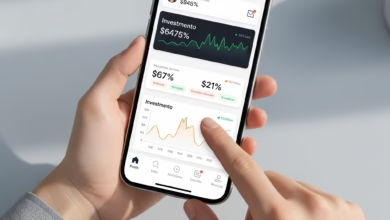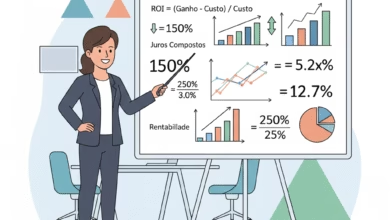How Safe Is Your Money with an Online Broker?
Find out how safe your money is at a brokerage firm

In the not-so-distant past, investing meant calling a person in a suit, paying hefty commissions, and receiving paper stock certificates. Today, trillions of dollars move with a tap on a smartphone. This incredible convenience, offered by countless online brokers, has democratized investing. But it also raises a crucial, multi-trillion-dollar question: How safe is your money really?
When you deposit your hard-earned cash into an online brokerage account, you’re placing your trust in a digital vault. But what if that vault is hacked? What if the brokerage company itself fails, like Lehman Brothers in 2008?
These are not trivial concerns. Understanding the layers of protection—and the real risks—is the most important step you can take besides picking the investments themselves. The short answer is: Your money is extremely safe with a legitimate, regulated U.S. online broker, but not all risks are created equal.
This comprehensive guide will break down every facet of brokerage safety, from federal insurance to cybersecurity, so you can invest with confidence.
What Happens if My Broker Goes Bankrupt? Unpacking SIPC Protection

This is the single biggest fear for most investors. You’ve built a $200,000 portfolio, and suddenly, news breaks that your brokerage firm has collapsed due to mismanagement or fraud. Is your money gone?
In the United States, the answer is a resounding no, thanks to the Securities Investor Protection Corporation (SIPC).
What Is SIPC and How Does It Work?
Think of SIPC as the investing world’s equivalent of the FDIC for banks. It is a non-profit, non-government, membership-based corporation created by Congress in 1970. By law, virtually all registered broker-dealers in the U.S. must be SIPC members.
SIPC’s job is not to protect you from bad investment decisions. Its one and only mission is to restore your assets if your broker fails and your assets are missing from your account dueGo to brokerage insolvency or unauthorized trading.
Here’s the process:
- Broker Fails: A broker is shut down due to bankruptcy or financial difficulty.
- SIPC Steps In: SIPC initiates a liquidation proceeding and, in most cases, works to transfer all customer accounts to another, healthy brokerage firm exactly as they are.
- Restoration: If your stocks, bonds, and cash can be transferred, they are. You’ll simply log in to a new broker’s platform and see your entire portfolio intact. This “bulk transfer” is the most common outcome and happens seamlessly.
- Cash Payout (The Backstop): If, for some reason (like fraud), your assets are missing and cannot be transferred, SIPC will provide protection up to $500,000 per customer for missing securities and cash.
- This $500,000 limit includes a $250,000 limit for cash held in the brokerage account (though, as we’ll see, most brokers have a separate protection for cash).
It’s crucial to understand what SIPC does not cover:
- Market Losses: If you bought $10,000 of a stock and it’s now worth $2,000, SIPC does not care. That’s investment risk, not broker risk.
- Worthless Securities: If a company you invested in goes bankrupt, SIPC won’t help.
- Commodities or Futures: These are not covered.
- Cryptocurrencies: Digital assets are not considered securities by SIPC and have zero protection.
The good news is that SIPC has a remarkable track record. Since its creation in 1970, it has recovered billions of dollars for millions of investors.
Beyond the Basics: What Is “Excess SIPC” Insurance and Do I Need It?
For investors with more than $500,000 at a single firm, SIPC coverage might seem insufficient. This is where “Excess SIPC” insurance comes in.
Most large, established brokerage firms (like Fidelity, Schwab, and Interactive Brokers) purchase private insurance from syndicates like Lloyd’s of London. This insurance kicks in after SIPC’s limits are exhausted.
The coverage can be massive. It’s common for a major broker to have an “aggregate” policy limit of $1 billion or more. This means that while SIPC covers the first $500,000, this excess policy covers assets well into the tens of millions of dollars per customer.
This is a significant feature that separates large, established brokers from smaller or newer fintech apps. When choosing a broker, look for their “Account Protection” page. They will always advertise their SIPC membership and any excess insurance they carry.
Is My Uninvested Cash Safe? The Difference Between SIPC and FDIC

This is one of the most confusing parts of brokerage safety. You have $50,000 in uninvested cash sitting in your account, waiting to be deployed. Is that cash protected by SIPC or the FDIC (Federal Deposit Insurance Corporation)?
Remember, SIPC’s cash protection is $250,000, and it only applies if the broker fails. But what if the bank the broker uses fails?
To handle this, nearly all modern brokers use something called a “cash sweep program.”
Here’s how it works: Any uninvested cash in your brokerage account is automatically “swept” at the end of each business day into interest-bearing accounts at one or more partner banks.
Because this money is now held at an FDIC-member bank, it is protected by the FDIC. The FDIC is a government agency that protects against bank failure. It covers $250,000 per depositor, per bank, per ownership category.
This is a much stronger protection for your cash. Many large brokers take this a step further:
- They partner with multiple banks (sometimes 10 or 20).
- They split your cash balance among these banks, keeping you under the $250,000 limit at each one.
- This allows them to offer FDIC insurance on cash balances of $1 million, $2 million, or even more.
So, for your cash: It’s almost always protected by the FDIC through a sweep program, which is separate from and arguably even safer than SIPC’s protection.
Are Online Brokers Hackable? A Deep Dive into Digital Security
Okay, so you’re protected if your broker fails. But what about a more modern threat: a cyberattack? What if a hacker gets into your account and liquidates everything?
This is no longer a question of SIPC or FDIC. This is a question of cybersecurity, and it’s a shared responsibility between you and your broker.
What Your Broker Does to Protect You
Legitimate brokers spend hundreds of millions of dollars a year on cybersecurity. Their business depends on it. Here are the standard, non-negotiable security features they implement:
- Data Encryption: All information you send—from your login credentials to your Social Security number—is protected by high-level SSL (Secure Sockets Layer) encryption. This is the same technology your bank uses.
- Firewalls and Intrusion Detection: They have sophisticated, multi-layered systems designed to detect and block malicious attempts to access their servers.
- Account Lockouts: If someone tries to guess your password too many times, the account is automatically frozen.
- Activity Alerts: You will typically receive an email or text alert for any sensitive activity, such as a password change, bank link, or money transfer.
What Happens If You Are Hacked?
Let’s say the worst happens. A hacker gets your password, logs in, and wires $50,000 to an offshore account. Are you out of luck?
Almost certainly not. Most major brokers offer a “$0 Liability Guarantee” or “Asset Protection Guarantee.”
This is the broker’s own promise to you: If your account suffers a loss due to unauthorized activity that was not your fault, they will reimburse you 100%.
There’s a critical catch, however. This guarantee is almost always contingent on you following basic security practices. If you write your password on a sticky note, use “password123” for everything, or fall for an obvious phishing scam and give your credentials away, they may argue you were negligent.
This brings us to the most important part of the security equation: you.
Your First Line of Defense: Critical Security Measures You Must Take

You are the weakest link in your own account security. But you can also be the strongest. Here are the essential steps you must take.
1. Enable Two-Factor Authentication (2FA) Right Now
This is the single most important thing you can do. Do not use a broker that does not offer it.
2FA (also called Multi-Factor Authentication or MFA) means that even if a hacker steals your password, they cannot log in without a second “factor”—a temporary, one-time code.
- Good (SMS 2FA): The broker texts a code to your phone. This is good, but vulnerable to “SIM-swap” attacks where a hacker takes over your phone number.
- Better (App-Based 2FA): You use an app like Google Authenticator or Authy. It generates a new code every 30 seconds. This is much more secure.
- Best (Physical Key): A device like a YubiKey plugs into your USB port. It’s virtually unhackable.
2. Use a Strong, Unique Password
Do not reuse your email, bank, or social media password. If any of those sites get breached, your brokerage account is next. Use a password manager (like Bitwarden, 1Password, or LastPass) to generate and store a 20+ character, random password for your brokerage.
3. Beware of Phishing Scams
You will receive fake emails that look exactly like they’re from your broker. They will say “URGENT: Your Account is Locked” or “Problem with your transaction.” They are designed to create panic.
- NEVER click a link in a security email.
- ALWAYS go to your browser and type in the broker’s website address manually, or use your official app.
- NEVER give your password or 2FA code to anyone, especially not over the phone or email. A real employee will never ask for it.
4. Secure Your Email Account
Your email is the key to your entire digital life. If a hacker gets into your email, they can just click “Forgot Password” on your brokerage account and take it over. Secure your primary email account with the same level of care: a strong password and 2FA.
Meet the Regulators: Who Ensures Your Broker Plays by the Rules?

Beyond SIPC, a whole alphabet soup of agencies regulates online brokers to ensure they are fair, transparent, and financially sound.
- SEC (Securities and Exchange Commission): The top federal watchdog. The SEC writes the rules that govern the entire securities industry, from brokers to stock exchanges. They focus on preventing fraud, insider trading, and market manipulation.
- FINRA (Financial Industry Regulatory Authority): This is the day-to-day “cop on the beat.” It’s a self-regulatory organization (SRO) that oversees every broker-dealer in the U.S.
- FINRA requires brokers to be properly licensed.
- It conducts regular audits to ensure firms are solvent and handling customer money correctly.
- It runs the BrokerCheck tool—a free service where you can look up any broker or brokerage firm to see their history, licenses, and any customer complaints or disciplinary actions.
When you use a broker, you aren’t just trusting the company’s logo. You are trusting a massive, interconnected regulatory system designed to protect you.
New Fintech Apps vs. Established Giants: Is There a Safety Difference?
In the last decade, sleek, mobile-first apps have challenged the “old guard” of brokerage firms. Is there a difference in safety?
From a regulatory standpoint, no.
Whether you use a brand-new app or a 50-year-old firm, if they are a U.S. broker serving U.S. clients, they must be a member of SIPC and be regulated by the SEC and FINRA. Their protections for your assets are identical.
The differences lie elsewhere:
- Customer Service: An established firm may have 24/7 phone support and physical branches. A new app might only offer email or chat support, which can be frustrating during a crisis.
- Excess SIPC: As mentioned, the large, established firms almost all carry massive “Excess SIPC” insurance policies. Many smaller, newer apps do not. If you have a multi-million dollar account, this is a major consideration.
- Business Stability: A large, diversified firm like Schwab or Fidelity has many lines of business and is incredibly profitable. A new app, especially one offering “$0 commission” trades, may still be burning through venture capital cash and not yet be profitable. While SIPC protects you from failure, it’s always smoother to be with a stable company.
- Security Features: Both old and new firms have excellent tech, but how they implement it can differ. Ensure any broker you choose supports, at minimum, an authenticator-app-based 2FA.
Warning Signs: When to Run from a “Brokerage” Offer
While legitimate brokers are safe, the internet is full of scams pretending to be brokers. These scams are where people truly lose everything, as there is no SIPC to save them.
Run fast if you see any of these red flags:
- Guaranteed Returns: “Invest with us and get a guaranteed 5% return every month!” This is the #1 sign of a Ponzi scheme. There is no such thing as a guaranteed return in investing.
- Crypto-Only Platforms: If a platform only deals in cryptocurrencies and is not registered with the SEC/FINRA, it is NOT a broker. Your assets have ZERO SIPC or FDIC protection. Many “crypto exchanges” have failed, taking all customer assets with them.
- Based Offshore: The platform says it’s based in a country with lax regulations. This is a deliberate tactic to avoid U.S. investor protection laws.
- Pressure to “Act Now”: High-pressure sales tactics, “exclusive” offers, or requirements to wire money immediately.
- Vague or Missing Information: You can’t find a physical U.S. address, a phone number, or any mention of FINRA or SIPC membership on their website.
Pro Tip: Before you send a single dollar, go to BrokerCheck.finra.org and type in the company’s name. If they aren’t listed, do not use them. Period.
Your Money Is Safer Than You Think (With the Right Precautions)

So, how safe is your money?
When held at a legitimate, U.S.-regulated online broker, your assets are protected by a powerful, multi-layered system:
- SIPC protects your securities and cash (up to $500k/$250k) if the broker fails.
- Excess SIPC (at most large firms) protects you for millions more.
- FDIC protects your uninvested cash (often for millions) through sweep programs if the partner banks fail.
- SEC and FINRA regulate these firms to prevent them from failing in the first place.
- Brokerage Guarantees (like $0 Liability) protect you from unauthorized transactions and hacking.
The complex financial system has been engineered, regulated, and insured to prevent a catastrophic loss of customer assets.
The real risks in 2024 and beyond are not that your broker will collapse. The real risks are:
- Market Risk: You make poor investment choices and your portfolio loses value. This is your risk to manage.
- Cybersecurity Risk: You use a weak password, no 2FA, and fall for a phishing scam. This is your risk to prevent.
- Scam Risk: You give your money to an unregulated, offshore “platform” promising the world. This is your risk to avoid.
Choose a well-known, FINRA-registered broker. Turn on 2FA. Use a strong password. And focus your energy on what truly matters: building a diversified, long-term investment plan.





